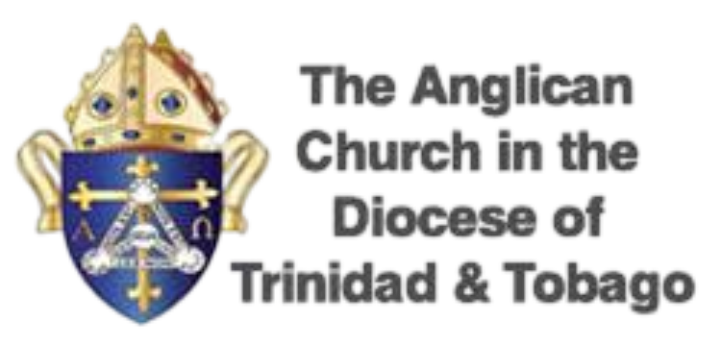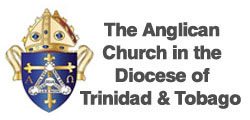Your cart is currently empty!
The Anglican Church in the Diocese of Trinidad and Tobago
The Cathedral Church of the Holy Trinity
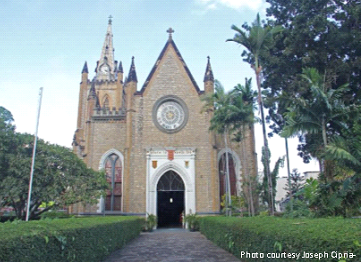
Choose your topic of interest below ▼
- Location
- Contact Information
- Our Vision Statement
- Our Mission Statement
- Organizational Structure
- Parish Groups
- Deans & Rectors of the Cathedral of the Holy Trinity
- The History of the Cathedral of the Holy Trinity
Location
30 A Abercromby Street, Port-of-Spain, Republic of Trinidad and Tobago, W.I.
Contact Information
Tel. Office: 623-7271 Fax: 624-9827 Email: motherchurch@gmail.com
Our Vision Statement
“To restore all people to unity with God and one another in Christ”
Our Mission Statement
“We Equip God’s People for Mission and Ministry”
Organizational Structure
Dean and Rector: The Very Reverend Dr. Shelley-Ann Tenia
Assistant Curates:
- The Reverend Father Augustus Thompson
- The Reverend David Pollard
- The Reverend Cheryl Mottley
- The Reverend Gerald Hendrickson
Lay Ministers:
- Mr. George James
- Mr. Hubert Phillip
- Mr. Brent Miller
- Ms. Erica Bayley
Eucharistic Assistants
- Ms. Ann Niles
- Mr. Alvin Stewart
- Mrs. Catherine Virgil
- Mr. Suresh Balliram
- Mr. Arden McLean
- Dr. Phaedra Pierre
- Ms. Niasha Joefield
- Mrs. Karen Cordner-Crichlow
- Mr. Adrian Gill
Rector’s Warden: Mrs. Elizabeth Samuel-Howe
Rector’s Warden Emeritus: Dr. Alan Patrick (Deceased)
People’s Warden: Mrs. Gwendolyn Roberts
Verger: Mrs. Brenda McLean Taylor
Assistant Verger: Vacant
Organist: Mr. Rico Cummins
Assistant Organist: Ms. Gloria Stewart
Organ Scholar: Mr. Ramon Howe (Overseas on Study Leave)
Vestry:
- The Very Reverend Dr. Shelley-Ann Tenia – Dean& Rector
- The Reverend Father Augustus Thompson – Assistant Curate
- The Reverend Fedinand David Pollard – Deacon
- The Reverend Cheryl Mottley – Deacon
- The Reverend Gerald Hendrickson – Deacon
- Mrs. Elizabeth Samuel-Howe – Rector’s Warden
- Mrs. Gwendolyn Roberts – People’s Warden
- Ms. Edwina Leacock – Chairman Finance & Administration
- Ms. Gwenyth Brizan – Chairman Social Outreach
- Mr. David Thomas – North-West Regional Council Representative
- Dr. Phaedra Pierre – Vestry Member
- Mrs. Catherine Vergil – Vestry Member
- Ms. Damali Manning – Secretary
- Mr. Cedric Joefield – Vestry Member
- Ms. Candice Marks – Vestry Member
- Mr. Carlos Taylor – Head of OSHA Team
Auditor: Ms. Hyacinth Symms
Office Personnel:
Parish Administrator: Ms. Lavaughn Honore`
Parish Secretary: Mrs. Natasha Hunte
Records Officer: Ms. Shanice Letren
Security Personnel:
- Ms. Renee Samuel – Security Supervisor
- Mr. Trevor Jones
- Mr. Steve Douglas
- Mr. Michael Joseph
- Mr. Michael Lovelace ( Relief Officer)
Ancillary Staff (Cleaners):
- Mrs. Irma Thomas
- Ms. Michelle Grimes
Groundskeepers: Mr. Trevor and Carlene Clarke
Parish Groups
- Mother’s Union
- A.C.M.S.
- Bible Class
- Cub/Scouts
- Folk Choir
- Sanctuary Guild
- Servers’ Guild
- Social Outreach
- Sunday School
- Ushers
- Worship Committee
- Christian Education
- Events Committee
- Youth on the Move
- Building & Lands
- Marriage Counsellors
- Stewardship
- Communications & Public Relations
- Archives
- Human Resource
- Finance and Administration
- Disaster Emergency Relief & Welfare Committee
- O.S.H.A.
- Deanery Committee
- T.A.G.S.
Parish Schools:
- Trinity College, Moka, Maraval
- Trinity Junior Anglican School
- Christus Rex Boys’ Anglican School
- St. Catherine’s Girls’ Anglican School
Home for Seniors: Oxford Street (St. Clare) Home
Parish Diary
Services held at Present
|
Friday |
6:15am |
Morning Prayer |
|
|
6:30am |
Holy Eucharist |
|
|
12:00noon |
Holy Eucharist |
|
Saturday |
5:00pm |
Holy Eucharist |
|
Sunday |
7:00am |
Sung Eucharist |
Parish Groups Monthly Meetings
Please Note: All monthly group meeting are held via our Zoom platforms in adherence to Covid 19 protocols. Should clearance be granted to resume normal activities; regular monthly group meetings would also resume
Deans & Rectors of the Cathedral of the Holy Trinity
|
The Rev. John H. Clapham |
|
The Rev. George Cummings |
|
(Became the first Archdeacon in 1842) |
|
The Rev. George W. Chamberlain |
|
The Rev. Samuel L.B. Richards |
|
(The Holy Trinity Church became The Holy Trinity Cathedral in 1872) |
|
The Rt. Rev. Richard Rawle |
|
(First Bishop of Trinidad) |
|
The Very Rev. Augustus E. Smith |
|
(The First Rector to be called Dean. In 1902 he was made Archdeacon in addition to being Dean) |
|
The Very Rev. Edward J. Holt |
|
The Very Rev. Harold Beardmore |
|
(Later, Bishop of St. Helena) |
|
The Very Rev. John E. M. Ashworth |
|
The Rt. Rev. Benjamin N.Y. Vaughan |
|
(Later, Bishop Suffragan of Mandeville, Jamaica; Bishop of Belize; Dean of Bangor, Wales; Bishop of Swansea and Brecon, Wales) |
|
The Very Rev. Fredrick D. Chaplin |
|
The Very Rev. Alfred T.P Harrison |
|
The Very Rev. Rawle E. Douglin |
|
The Rt. Rev. Rawle E. Douglin |
|
The Very Rev. Dr. Knolly U. Clarke |
|
The Very Rev. Richard I. C. Sampson |
|
The Right Rev. Claude Berkley |
|
(First Tobagonian as both Bishop & Ordinary of the Cathedral) |
|
The Very Rev. Dr. Shelley-Ann Tenia |
The History of the Cathedral of the Holy Trinity
The Cathedral Church of the Holy Trinity which is the mother church in the Anglican Diocese of Trinidad and Tobago stands majestically in the heart of the capital city of Port-of-Spain. Since its consecration in 1823, this building has been a geographical icon and a national landmark of Trinidad and Tobago.
The first Anglican Church, known simply as the Trinity Church, was a modest wooden building on the corner of Prince and Frederick Streets. In 1808, a great fire swept through the city, destroying every public building, including the church. In 1809, the British Crown granted money for the construction of the new church. The construction was started in Brunswick Square (now Woodford Square), but there were objections from the public resulting in a halt to construction.
On May 30th 1816, the cornerstone of the Trinity Cathedral was laid in its current location on 30A Abercromby Street, Port-of-Spain. Architecturally, the Cathedral reflects the late Gregorian style mixed with the Gothic, as well as elements of the Victorian Age. The layout was designed by the Colonial Secretary, Philip Reingale. The magnificent hammer-beam roof is made of local wood and characterized by huge trusses. The altar is built entirely of selected local mahogany and backed by alabaster and marble mounted on a base of Portland stone. The stained glass windows showcase magnificent representations of the saints. The Cathedral is filled with interesting historical items, such as the marble statue dedicated to former Governor and founder of the Church, Sir Ralph Woodford. Along the walls inside the Cathedral are tablets placed “in memory of” former members of the British elite of colonial days. The Cathedral of the Most Holy Trinity was consecrated on Trinity Sunday, May 25th, 1823.
The Labyrinth and the Garden of Peace
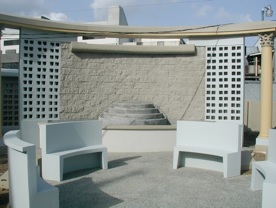
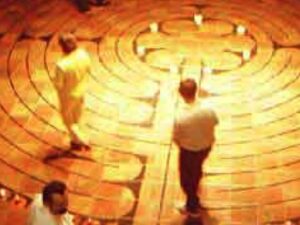
The Labyrinth and The Garden of Peace are now well established as sacred spaces of Holy Trinity Cathedral in Port-of-Spain, Trinidad. The history of these sacred spaces is linked to two Anglican anniversaries which were celebrated in 1998. That year marked the 175th anniversary of the Parish Church of Holy Trinity, and, the 125th anniversary of The Anglican Diocese of Trinidad and Tobago.
Dean Knolly Clarke initiated The 175th Anniversary Committee under the chairmanship of Dr. Alan Patrick. In the course of the Cathedral’s celebration, Bishop Rawle Douglin invited Dr. Patrick to extend his chairmanship to the 125th Anniversary Committee of The Anglican Diocese of Trinidad and Tobago. Both committees highlighted the Church’s contribution to this country especially in the areas of Arts, Education and Social Outreach. It was felt that the success of these celebrations should motivate the Church to face the challenges of the future.
At that time, the world was on the eve of the 21st century which signaled enormous cultural changes through the advancement of information and communication technologies. Already, there were two major shifts in the culture of Trinidad and Tobago. With regard to religion, the country still respected rituals, but more people were embracing life as a personal walk with God. This shift led to the construction of the Labyrinth as a sacred space for private prayer. With regard to final rites, there was also a major shift in the thinking of our national public. The society was becoming more open to cremation and the interment of remains in beautiful sacred spaces. This was the impetus for the construction of The Garden of Peace on the Cathedral Grounds.
The Organ
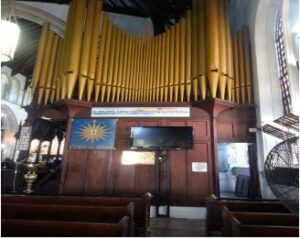
The organ was originally installed in 1914 and was built by J.W. Walker and Company, a prominent UK organ builder. It is a three (3) manual (keyboard) instrument with pedals and the variety of stops gives it great versatility in accompanying small, intimate acts of worship and large Diocesan and Civic Services in the Cathedral as well as being a superb recital instrument.
In 2010 the Cathedral authorities embarked on an ambitious programme to have the organ completely re-furbished and rebuilt, and this process is ongoing. The pipework and inner workings of the instrument were cleaned and replaced and repaired, and the new ‘detached’ console (the part of the instrument which the organist plays) has been installed. Thus, we now have a fine instrument which employs the latest in modern technology, including fibre optics, combined with original pipe-work which is now over a century old. We are most grateful for the advice, expertise and skill of Mr. David Burke of Burke Organ Builders of Barbados who has diligently and expertly seen this project through to fruition. It is interesting to note that Mr. Burke was originally trained by Walkers UK who originally built the instrument.
There is still work to be done to enhance and expand the organ. It is also vital that the instrument is regularly maintained and tuned to keep it in pristine condition. This should ensure that its ‘life’ continues well into the next century.
The Cathedral Chapter
| “Decani” | |
| Archdeacon of Tobago | The Venerable Phillip Isaac |
| Archdeacon of North Trinidad | The Venerable Kenley Baldeo |
| Stall of St. Boniface | Vacant |
| Stall of St. Chad | The Reverend Canon Richard Jacob |
| Stall of St. Aidan | Vacant |
| “Cantoris” | |
| Archdeacon of South Trinidad | The Venerable Edwin Primus |
| Stall of St. Hilda | Vacant |
| Canon Missioner | The Reverend Canon Colin Sampson |
| Stall of St. Cuthbert | Vacant |
| Stall of St. Patrick | The Reverend Canon Erwin Tembo |
| Dean Emeritus | The Very Reverend Dr. Knolly Clarke |
| Archdeacon Emeritus | The Reverend Canon Kenneth Forrester |
| Archdeacon Emeritus | The Reverend Canon Dr. Steve West |
| Canon | The Reverend Canon Winston Mulcare |
| Canon | The Reverend Canon Francis Caesar |
| Canon Emeritus | The Reverend Canon Christopher Drakes |
| Canon | The Reverend Canon Ronald Branche |
| Canon Emeritus | The Reverend Canon Selwyn Nurse |
| Canon Emeritus | The Reverend Canon Hilton Bonas |
| Canon Emeritus | The Reverend Canon Jemmott Hazelwood |
